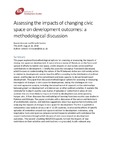| dc.contributor.author | Hossain, Naomi | |
| dc.contributor.author | Santos, Ricardo | |
| dc.coverage.spatial | Pakistan | en |
| dc.coverage.spatial | Ethiopia | en |
| dc.date.accessioned | 2019-04-09T12:58:41Z | |
| dc.date.available | 2019-04-09T12:58:41Z | |
| dc.date.issued | 2018-08-18 | |
| dc.identifier.citation | Hossain, N. and Santos, R. (2018) 'Assessing the Impacts of Changing Civic Space on Development Outcomes: A Methodological Discussion', Brighton: IDS | en |
| dc.identifier.uri | https://opendocs.ids.ac.uk/opendocs/handle/20.500.12413/14455 | |
| dc.description.abstract | This paper explores the methodological options for assessing or measuring the impacts of closing civic space on development. It summarises a review of literature on the forms and spread of efforts to restrict civic space, and its impacts on civil society actors and their contributions to development. It briefly discusses the conceptual framework developed, which focuses on understanding the nature of the fit between states and civil society actors in relation to development, and on how this differs according to the distribution of political power, and the degree of elite commitment and state capacity to deliver broad-based development. The paper then discusses methodological options for assessing or measuring the impacts of changes in civic space for development, noting the challenges of cross-national regression analysis, including the mixed record of research on the relationships between growth or development and democracy or other political variables. It explains the rationale for in-depth country case studies of episodes of contention in areas of civic activism that are most likely to impact on frontline development outcomes (poverty, hunger, etc). It then discusses the methodological learning from two country case studies in Pakistan and Ethiopia. The paper concludes with a discussion of the nature and limitations of available data sources, and sketches suggestions about two approaches to tracking and analysing the impacts of changes in civic space for development. The first is qualitative comparative case analysis across a set of 12-20 countries, to analyse the effects of specific episodes of contention around civic space in relation to development outcomes, using longitudinal tools and rigorous comparative techniques to establish with confidence the causal mechanisms through which closures of civic space impact on development outcomes.. The second is building NGO/CSO capacity to track the impacts of new restrictions on their activities and contributions in a grounded, locally-relevant way. | en |
| dc.language.iso | en | en |
| dc.publisher | IDS | en |
| dc.rights.uri | http://creativecommons.org/licenses/by-nc/4.0/ | en |
| dc.subject | Governance | en |
| dc.subject | Politics and Power | en |
| dc.title | Assessing the Impacts of Changing Civic Space on Development Outcomes: A Methodological Discussion | en |
| dc.type | Unpublished/work in progress | en |
| dc.rights.holder | IDS | en |
| dc.identifier.team | Power and Popular Politics | en |
| rioxxterms.funder | Department for International Development | en |
| rioxxterms.identifier.project | Measuring the Impact of Closing Civic Space on Development | en |
| rioxxterms.version | AO | en |
| rioxxterms.funder.project | 61a942ac-268b-481c-a8b5-9e5a50e1a973 | en |


